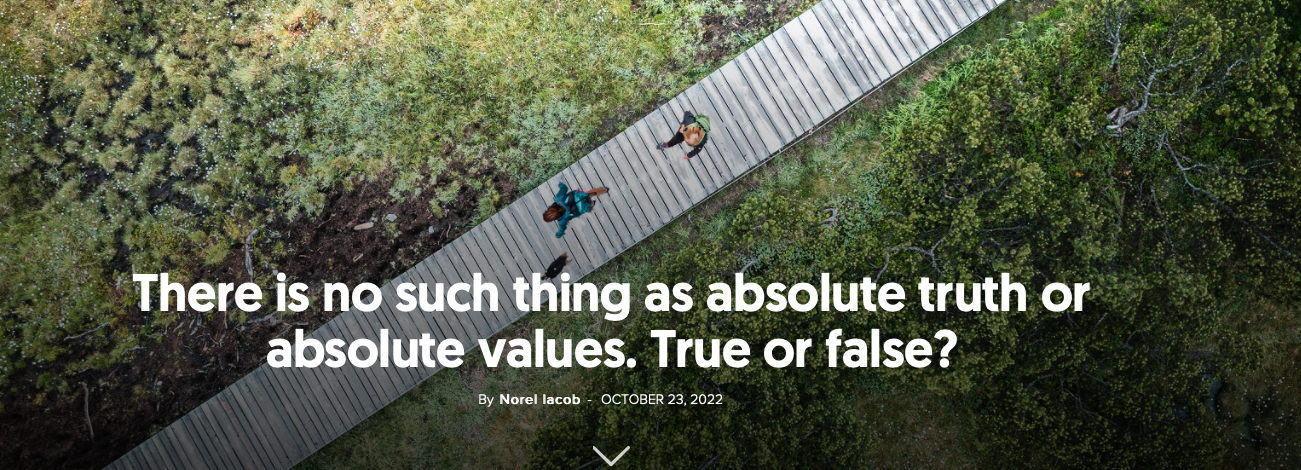“Borg creatures.[1] A highly advanced race of predators. They have no conscience. No ethic. Chances are, it has already infected your community, your schools, your church—even your children. This real-life threat is called ‘the new tolerance’, a simple phrase that describes a complex modern doctrine”[2] (Josh McDowell).
While tolerance in the traditional sense meant acknowledging and respecting the beliefs and convictions of others without sharing them, the “new tolerance” claims that all beliefs, lifestyles and statements that aspire to be true are equal because they are relative. In other words, there is no single truth, only multiple truths. And morality is variable, according to taste.
“A world with too many taboos. Too little tolerance in accepting people’s deviations in sexual behaviour,” said Stellan Skarsgard, the male lead in the controversial film Nymphomaniac II. When the film was banned in Romania because of its sexually explicit scenes, a Romanian radio station was quick to blame: “A conformist solution by ignorant, traditionalist people.”
If tolerance based on relativism is the rule, it is easy to understand why values considered traditional are being devalued from primary school onwards. Around Christmas, Isaia Martinez, a 6-year-old girl, had brought some lollipops with messages about the life of Jesus to her classmates. In the spirit of political correctness,[3] the teacher tore up the messages and threw them in the bin. “You are not allowed to talk about Jesus in school!” The priority was to avoid offending the “truths” of others.
The “conversion” of tolerance
In recent decades, we have witnessed a complete paradigm shift regarding this concept.[4] Tolerance defined in the spirit of modernity has been replaced by a new postmodern tolerance. Postmodern humanity is a “prisoner of ethical relativism”[5] in which the dichotomy of good and evil has been reformulated.
Postmodernism destroys absolute values by virtue of absolute non-values. Thus, televised sex has become art[6] and religion the subject of satire. Under these circumstances, the play Evangelists, which offends religious sentiments through eroticism and nudity, was performed to a full house on the stage of the Athenaeum in Iasi in 2006. “We’re talking about a kind of nudity that doesn’t affect the audience. I think that, artistically speaking, we still don’t have a healthy system of values,” said a member of the Romanian Ministry of Culture commission sent to supervise the play.
So what is the point of truth in the first place?
In the age of the “new tolerance,” it is not only ethics that are being relativised. Beliefs are being diluted. As a result, “what the politically correct tolerance is giving us is a decaffeinated belief: a belief which does not hurt anyone and does not fully commit even ourselves.” The search for philosophical truth thus becomes a pointless exercise. Instead, diversity emerges as the successful emblem of postmodern civilisation. But in this case, says Andrei Pleșu, the negotiation of dialogue is pointless, since the result is mutual agreement that the other is right. “In a world governed by such rules, Socrates would have nothing to work with. There is no truth to be learned, no argument to be made. All we have to do is politely respect the beliefs of our interlocutor.”[7] In essence, truth is everywhere and nowhere. What counts is consensus, not progress.

Fear of absolutes
The concept of the “new tolerance” emerged as a response to the many crises that human society has experienced in the last century. The Holocaust, the Gulag,[8] and nationalism are just some of the “emblems” of a century marked by intolerance fuelled by a belief in absolute truth, be it political or religious. And inter-ethnic conflicts, also fuelled by religion, have not disappeared even today. In Syria, Muslims are killing Christians in the name of the one truth. In the Central African Republic, Christians are killing Muslims. Certainly, religious absolutism can lead to serious abuses. History bears witness to this.
The architects of the new tolerance are convinced that the solution lies in the destruction of absolute ideologies and manifestations. The dilution of truth thus becomes an end in itself. In reality, what was supposed to be a solution has become an even bigger problem. In fact, we are witnessing intolerance in the name of tolerance, a forcing of the individual to be uncertain about anything. Why? Because the core of the problem is whether or not there is objective truth. So the postmodern version leads to a new form of totalitarianism built on the foundation of a relative truth that must be appropriated by everyone. Even if it is not quite the totalitarianism of George Orwell’s novel 1984[9], analysing the implications of the dictatorship of an ideology can be very educational.
“1984” versus 2014
Orwell’s totalitarian society was characterised by “newspeak” (politically correct language) and “doublethink” (the Thought Police had to ensure that two opposing beliefs could be held and accepted in the mind at the same time). The protagonist, Winston Smith, was tortured until he swore that two plus two equals five…and came to believe it.
The purpose of the “newspeak” was not only to provide a means of expressing the new worldview, but also to make any other way of thinking impossible.
Orwell’s fiction became reality under left-wing totalitarianism, but not exclusively. In the “newspeak” of the new tolerance, truth expressed with conviction can be seen as a source of intolerance. For this reason, neutral terms are sought to facilitate “doublethink.” Thus homosexuals have a “different sexual orientation,” cohabitation has become a “consensual union,” a wife is a “partner,” and abortion is nothing more than a “voluntary termination of pregnancy.” Basically, it is not the vocabulary that matters, but the philosophy of life that redefines black and white.
The new semantics born of political correctness has led H.R. Patapievici to conclude that it is “no different from the old fascist or communist ideal of the forced ideologisation of society.”[10] A similar view is expressed by the British philosopher Philip Atkinson, according to whom political correctness is generated by “the same mentality that inspired the Inquisition and forced Galileo to recant; the same mentality that inspired the Nazis and obtained the Holocaust.”

An absolutely relative future
A Barna study confirms that such a philosophy has real effects. For example, 64% of adults and 83% of American teenagers say that truth depends on circumstances. In other words, nothing is clear, everything is subjective. The intolerance of the “new tolerance” is an inevitable consequence. The Christian conservative press in the United States has reported numerous instances where Christians of different denominations have been accused of “extremism” for being faithful to their own beliefs and making statements that those in the opposite camp find intolerant.
Ben Carson, one of the best-known neurosurgeons in the US and an opponent of the Obama administration, has experienced the disagreement of the majority over his religiously motivated beliefs. Opposing a change in the definition of marriage, Carson has trenchantly stated that no one, “no group, be they gays, be they NAMBLA,[11] be they people who believe in bestiality—it doesn’t matter what they are, they don’t get to change the definition,” justifying his position by the fact that he is “a Bible-believing Christian.” Carson was subsequently forced to apologise to those who were offended by his language. But it turned out that it was not the language that was at issue, but the doctor’s own beliefs that could not be tolerated. Because Ben Carson did not nuance his position on the issue, students at Johns Hopkins Medical School called for Dr Carson to be disinvited from speaking at their graduation ceremony, and a CNN journalist concluded that Ben Carson was “an admirable man, but with a mistaken philosophy.”
Beyond the positive aspects promoted, such as the easing of inter-ethnic, inter-racial, and inter-religious tensions, the new tolerance envisions a future for humanity very different from the one we already know—a future of relativity, permissiveness, and their dictatorship. As expected, Nymphomaniac II eventually was cleared for release by the Romanian National Film Centre. The art of the new tolerance had triumphed.


















